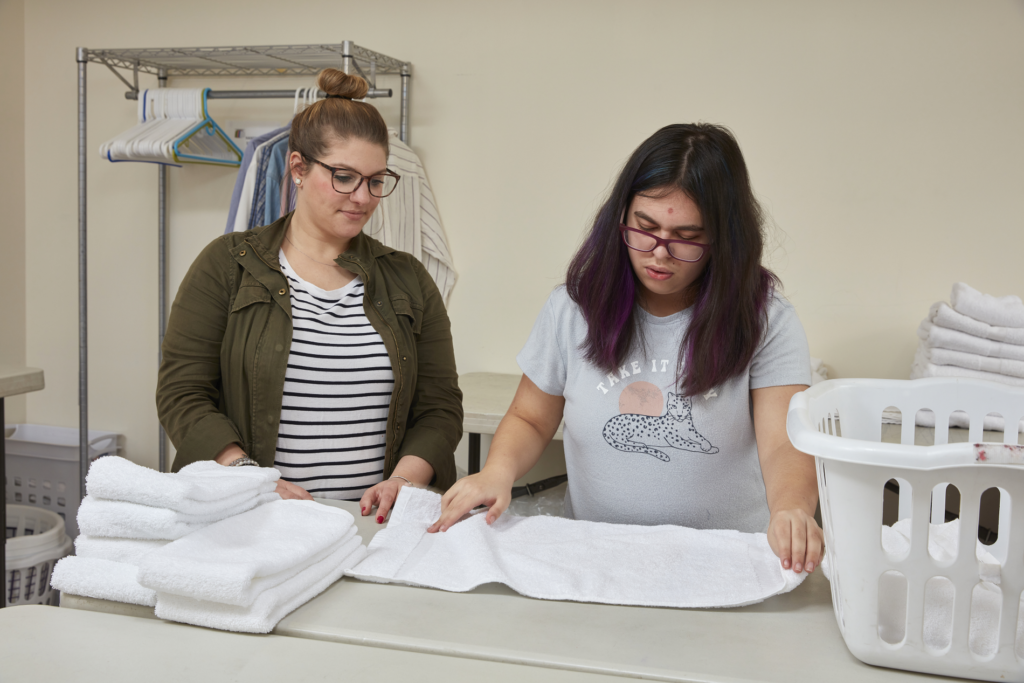NLG’s Vocational and Life Skills Training Program prepares young adults with Autism to function with the greatest possible productivity and independence in the community, home, and workplace throughout their lives.

Vocational Training Program
The purpose of NLG’s Vocational Program is to give our students the tools they will need to succeed in adulthood. This includes performing job tasks independently, working in a group setting with reduced supervision, accepting direction from supervisor, soliciting help appropriately and maintaining appropriate behavior. Our students are taught a core set of skills in a variety of training areas to increase their chances of obtaining gainful employment as an adult.
NLG students enter the Vocational Training Program when they reach 14 years old. The training program operates on an internship model. Students spend approximately 6 months learning a core group of skills in each of our 6 training areas. The internship model allows the student to develop a repertoire of skills within a given area before moving onto the next training domain. As each student approaches transition age his or her time in the program is gradually increased, allowing for training throughout all areas. The focus of the program is to teach the student to perform essential job skills independently. We utilize a variety of reinforcement and prompting strategies to achieve independence, which are then systematically faded to more natural levels.
Our training areas are grouped under the following categories:
- Hospitality Skills
- Janitorial Services
- Clerical Skills
- Assembly Skills
- Laundry Services
- Retail Skills
Internal Employment Program
The purpose the Internal Employment Program is twofold; students are taught to take direction on the spot to complete a variety of tasks and the level of supervision for each student is systematically faded. As the students increase their independence and productivity, the level of supervision is systematically faded. When a student can maintain appropriate behavior and quality work, the student begins to share a supervisor with another student. The other teacher observes from out of sight and is available to immediately respond to challenges when needed.
NLG regularly receives work to be completed from outside sources. The tasks include: folding documents, stuffing and addressing envelopes, weighing and packaging various kits, and assembling materials. In addition to completing outside work, NLG is developing several of our own business ventures. Students will create products onsite and then will market the products to local businesses and individuals; items will also be available for purchase at NLG’s online store.
External Employment Program
The purpose of our External Employment Program is to generalize skills learned to a natural work environment. Students are taught to accept direction from novel supervisors as well as solicit help from supervisors or peers when needed. Supervision is systematically reduced until the students are working in a small group with a shared supervisor. Teachers monitor the students from out of sight and are available to immediately respond to challenges when needed.
Several local businesses have opened their doors to our students. These include a convenience store, a hospital cafeteria, a gym/sports club and a medical billing company. These sites have been critical in gaining real world employment experience for our students. Candidates for the external employment program include students who are able to maintain appropriate behavior with reduced supervision and complete work tasks to a high-quality standard for a specified amount of time.
Life Skills
From entry into NLG students immediately begin to work on self help skills, emergency and safety skills, and caring for their health. Students also access the community for leisure and recreation, learning appropriate behaviors within the community and travel safety. Around the age of 14, students increase their work on meal planning and preparation, planning and managing their own schedules and prerequisites for economics and community participation. As the student continues at NLG, the proportion of the day spent on life skills training is gradually increased.
Life skills training is grouped under the following categories:
- Daily Living Skills;
- Meal Preparation;
- Personal Economics (budgeting, planning);
- Community participation;
- Grocery Shopping,
- Retail Shopping,
- Banking,
- Dining,
- Recreation and Leisure
- Exercise for Health and Fitness